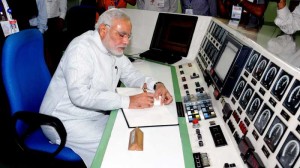
Prime Minister Narendra Modi Monday reiterated that energy security, increasingly based on clean and reliable sources, was the critical driver of India’s rapid and sustained long-term development.
On a visit to the Bhabha Atomic Research Centre (BARC) here during his maiden trip to Maharashtra after taking over as prime minister, Modi envisaged an essential role for nuclear energy in India’s energy strategy, especially given the scale of demands in the country.
In this regard, Modi assured the department of atomic energy (DAE) his full support in its ambitious expansion programme.
He expressed hope that the DAE would achieve the targets of increasing capacity by three times – from the existing level of 5,780 MW – in the next 10 years within the projected costs.
The prime minister also underlined the importance of ensuring that nuclear energy remained commercially viable and competitive with other sources of clean energy in the long run by continually upgrading technology, both in the long-term plans and international trends.
In this context, he said India would need to tap additional sources of investments for the ambitious expansion programme, and welcomed the country’s growing international partnership in the nuclear energy. He hoped for timely implementation of the ongoing projects with adherence to requirements of techno-economic viability and safety standards.
Lauding the achievements of India’s scientific community in the nuclear sector, Modi said their success was especially creditable as it has taken place in the face of decades of international technology denial regime.
“India’s self-reliance in the nuclear fuel cycle and the commercial success of the indigenous reactors demonstrated that with vision, resolve and hard work, India could be a front-ranking country in the most challenging fields,” he said.
Exhorting the DAE to present the ‘human face’ of India’s nuclear science capabilities to the world, Modi said nuclear safety and security were of highest priority.
He also asked the DAE to pay special attention to the local communities in planning and implementing nuclear power projects.
Congratulating the DAE for its upcoming diamond jubilee Aug 3, Modi asked the department to plan a year-long celebration focusing on the various developments of atomic science, with special outreach to youth in schools and colleges all over India.
Earlier, Modi was received by DAE secretary and Atomic Energy Commission chairman R.K. Sinha and other top officials at the BARC in Trombay.
During his four-hour trip, Modi visited the Dhruva reaction and other facilities and viewed an expo on various societal applications of the nuclear and radiation technologies in food and agriculture, healthcare, water resources and environmental protection, before attending a presentation on the Indian Atomic Energy Programme.
National Security Advisor Ajit Doval and Joint Secretary, PMO Javed Ashraf were also present on the occasion.